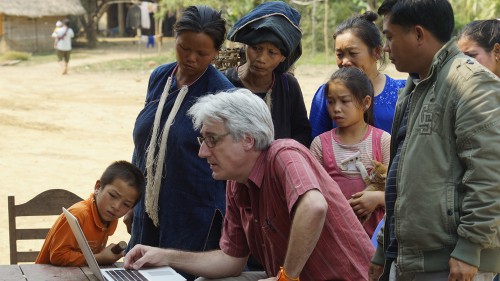27th May 2013 Vientiane, Laos
Laos through my eyes – Andrew Bartlett
This article is part of a series of guest blogs contributed by Brits who have lived and worked in Laos, or who have other interesting links to Laos.
My first visit to Laos was in 1983 when I was part of a young professional scheme funded by the British Aid programme. I had been attached to a regional UN office in Bangkok specialising in development training and communication, and I was sent to Vientiane to prepare a booklet on ‘The UN System in Lao PDR’ to be used at the first Round Table meeting.
The contrast between the hectic pace of life in Bangkok and the apparent tranquillity of Vientiane was refreshing, but the boarded-up restaurants and rusting helicopters at the airport created a sombre atmosphere in the Lao capital at that time.

Over the next 20 years, I visited Laos on a number of occasions with the UN, but it was not until 2004 that I came to live in the country.
As the Chief Technical Adviser for a Swiss-funded agriculture project, I finally had the opportunity to observe the astonishing diversity, both environmental and cultural, which exists in Laos. I also began to realise that rural people in Laos are as dependent on ‘gathering’ as they are on ‘farming’.
The diet of villagers often includes long list of roots, herbs, nuts, insects, frogs, fish and other creatures that are collected from the wild.
Towards the end of 2006, I launched a mailing list for a small group of colleagues on the subject of Lao Farmers and Agribusiness, known by the abbreviation ’LaoFAB’. The group attracted far more interest than expected, and LaoFAB is now an online discussion groups with more than 3,000 members, and a digital library containing more than 2,000 reports.
Discussion at LaoFAB is in English, but a similar group called ‘LaoLink’ has been created for Lao speakers, and this also has thousands of members, including government officials, development workers, academics and students.
Together, these groups provide an opportunity to share news about policies and projects, and exchange opinions on a wide range of issues relating to rural development, including farming systems, land management, hydropower and foreign investment.
I have always believed that education is just as important as economic development, and this is particularly true in a country that has been ‘land-locked’ in more ways than one. Discussion groups like LaoFAB and LaoLink are a small part of the ‘information revolution’ that has started in Laos.
Farmers are now using mobile phones and watching satellite TV, and the use of the internet is spreading rapidly in urban areas.
According to one source, there are already more than 250,000 Facebook users in Laos! The precise consequences of this revolution are impossible to predict, but we can be sure that new knowledge will affect the opportunities and aspirations of everybody in the country. Lao citizens are now asking questions and making decisions that were previously unthinkable.
After living overseas for nearly 30 years, including 5 years in Vientiane, I returned to the UK with my family in 2010. I soon discovered how difficult it is to leave Laos, and have been back to the country eight times in less than three years. I have also discovered that whether I am in South-East England or South-East Asia, I am addressing the same issues: the global food industry, environmental degradation, the role of civil society and information networks.
It seems that Laos is closer – much closer – to the UK than it appears on the map.
It is such a well-written article. Thank you for doing that and sharing it.
You could definitely see your enthusiasm in the work you write.
The world hopes for even more passionate writers like you who are not afraid to say how they believe.
All the time go after your heart.
Mr. Phillip, I read your blog times without number and I found it so interesting. I concluded in my mind that you are really a pacemaker. You left great things behind.
Dear Philip,
what an outstanding series ” Laos through my eyes” ! Every guest blog is worth to write a comment. But this one impressed me a lot. Because it describes so well a personal story about this nation over more as 2 decades. Plus the importance of the British Aid programme for such a long time. So it ´s true : L A O S i s n o t only much closer to Great Britain as it seems – it ´s really somehow in the neighbourhood. Just open your eyes. Best wishes , liebe Grüßle , Ingo-Steven Wais, Stuttgart